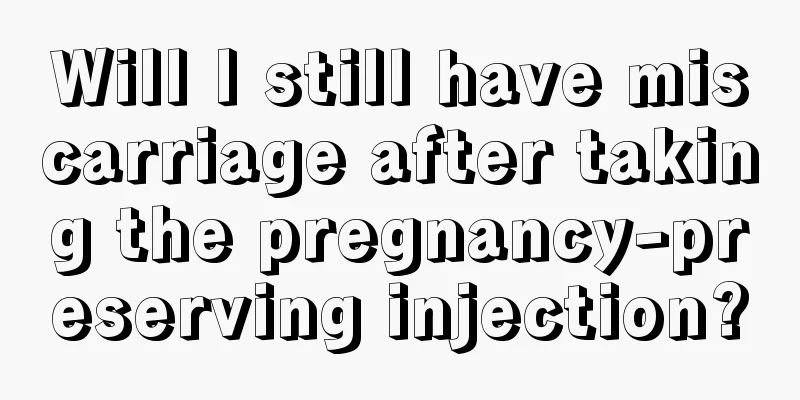Will I still have miscarriage after taking the pregnancy-preserving injection?

|
Women are very likely to have miscarriage in the early stages of pregnancy, so women need to pay special attention when they are three months pregnant. If there is a risk of threatened miscarriage, they need to undergo treatment to preserve the pregnancy. Some people think that after taking pregnancy-preserving drugs or getting pregnancy-preserving injections, they will not have miscarriage. In fact, this is not absolute. It is just that during the period of taking drugs or getting pregnancy-preserving injections, it is best to rest in bed and try to avoid stimulation. What causes miscarriage? 1. Insufficient placental endocrine function In early pregnancy, in addition to the progesterone secreted by the corpus luteum of the ovary, the placental trophoblast cells also gradually produce progesterone. After 8 weeks of pregnancy, the placenta gradually becomes the main site for the production of progesterone. In addition to progesterone, the placenta also synthesizes other hormones such as β-chorionic gonadotropin, placental lactogen and estrogen. During early pregnancy, the above hormone levels drop, making it difficult for the pregnancy to continue and leading to miscarriage. 2. Genetic factors In early spontaneous abortion, 50% to 60% of embryos have chromosomal abnormalities, most of which are abnormalities in chromosome number, followed by abnormalities in chromosome structure. Numerical abnormalities include trisomy, triploidy and X monosomy. Structural abnormalities include chromosome breaks, inversions, deletions, and translocations. Most embryos with chromosomal abnormalities end in miscarriage. A very small number may continue to develop into a fetus, but some functional abnormalities or combined malformations may occur after birth. If a miscarriage has occurred, the products of conception are sometimes just an empty gestational sac or a degenerated embryo. 3. Immune factors Pregnancy is like allogeneic transplantation. There is a complex and special immunological relationship between the embryo and the mother, which prevents the embryo from being rejected. If the immune system of both mother and child is not compatible, the mother may reject the embryo and cause miscarriage. The relevant immune factors mainly include paternal tissue compatibility antigens, fetal specific antigens, blood type antigens, and maternal cellular immune disorder. 4. Environmental factors There are many adverse external factors that affect reproductive function, which can directly or indirectly cause damage to the embryo or fetus. Excessive exposure to certain harmful chemicals, such as arsenic, lead, benzene, formaldehyde, chloroprene, ethylene oxide, etc. and physical factors, such as radiation, noise and high temperature, can cause miscarriage. |
<<: How long should I take Chinese medicine for uterine cold before getting pregnant?
>>: What should I do if I still bleed after one week of pregnancy?
Recommend
How many days can menstruation be delayed at most?
Nowadays, many women have gynecological diseases,...
Is it easy to lose temper during early pregnancy?
Many men said that their wives, who originally ha...
Raising the hips to correct the fetal position
Many female friends go to the hospital for check-...
How to carry out maternity confinement care and postpartum recovery?
With the continuous development of social economy...
Sun Baoguo: When will the illegal addition of food additives stop?
Professor Sun Baoguo Academician of the Chinese A...
Teach you a trick to identify medicines, health products and food
During the stay-at-home period, e-commerce is boo...
Can I use moxibustion when my period comes?
Moxibustion is a type of acupuncture therapy in t...
Pain on the outside of the breast
Breasts are the most critical part of the human b...
Dietary taboos during pregnancy
Pregnant women should pay more attention to their...
How much does a kidney transplant cost? How long can you live after a kidney transplant?
Although kidney transplantation is the best way t...
How is apple cider vinegar made? How is apple cider made?
Apple cider vinegar contains pectin, vitamins, or...
Girls are irritable during their menstrual period
Many people have a bad temper, because not everyo...
comScore: Instagram website traffic surges 78%
$1 billion can buy a lot of things, and for Insta...
What causes stomach pain in early pregnancy?
Pregnancy is a great joyous event for a family. T...
Men can also be at risk for breast cancer. Should both men and women pay attention to breast health?! Pink October, please keep this breast care manual
The female breast is mainly composed of lobules (...









